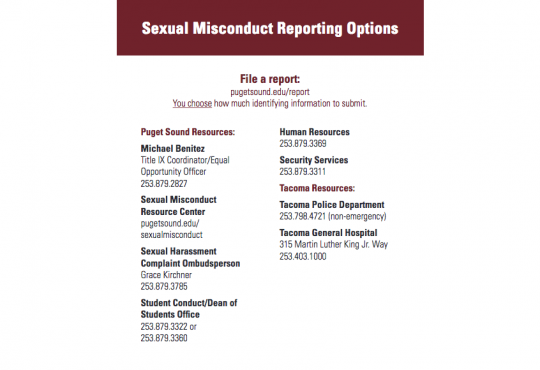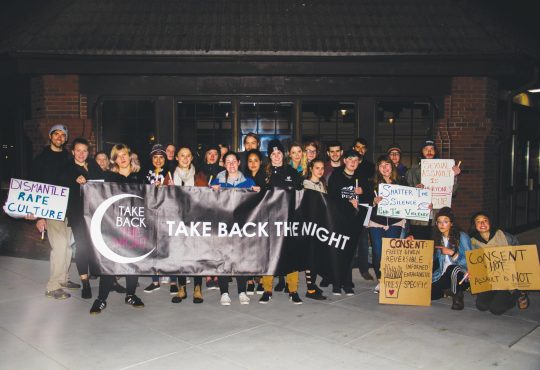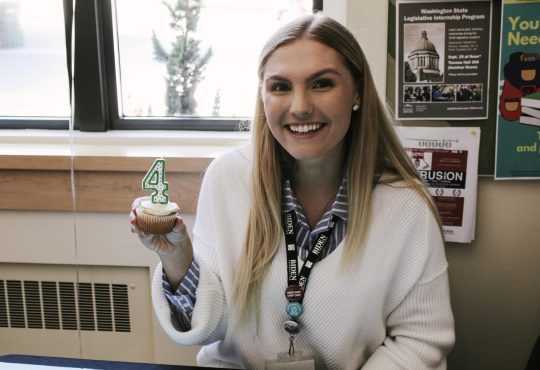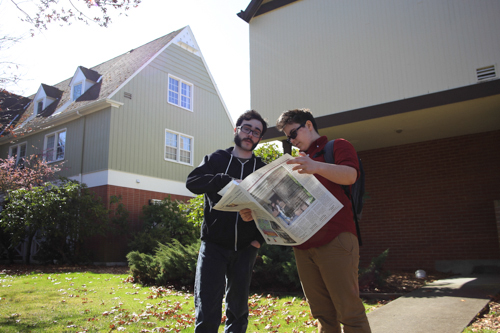Last Wednesday, April 8, at 8:30 p.m., more than 60 students met in the Wyatt Atrium to participate in Puget Sound’s Take Back the Night Rally and Speak Out. Lindsey Conrad, the Sexuality Issues, Relationships and Gender Education (SIRGE) Coordinator of the Office of Intercultural Engagement, led this event.
“Take Back the Night is this annual event that goes on at college campuses all throughout the U.S. and all throughout the world, as a space to reclaim the night and reclaim dangerous spaces, or spaces that are labeled as being dangerous,” Conrad said. “And it’s really a space to empower survivors, because survivors are so frequently told by our society that they shouldn’t talk about their experiences and their experiences aren’t valid.”
This event, sponsored by SIRGE, began with a march of about 60 students and faculty who circled within campus and on Alder Street. Participants held posters and were led by students in chants including, “We have the power. We have the right. The streets are ours. Take Back the Night!”
During the rally students received a variety of responses from onlookers, ranging from expressions of support to individuals heckling rally-goers.
“On the one hand, students should be allowed to use their freedom of speech to express their thoughts and opinions, no matter how obscene those opinions may be,” senior Nika Neshybara said in response to the hecklers. “As soon as we start restricting voice for some students, everyone’s voice is threatened. On the other hand, students should try to recognize the full impact of their words and thus avoid being cruel or ignorant towards issues they are unfamiliar with.”
A number of students filed a report with the Bias Hate Emergency Response Team, a group of campus administrators tasked with responding to incidences of bias and hate.
Despite that, most attendees found the rally powerful.
“I like going because I think that it’s meaningful, I think that it’s a good thing to create a safe space for people to be able to speak out about their experiences. It’s definitely debated but we need to have opportunities to create that place of communication and of being a safe place,” Sarah Cobbett, sophomore rally participant and Peer Ally, said.
By the end of the rally, there were more than 70 participants who circled back into the Wyatt Atrium, where Take Back the Night continued with the Speak Out portion, in which survivors were welcomed to share their experiences with violence and healing in an open-mic format.
“I think it’s more accurate that most survivors are surviving, they have not survived quite yet,” Conrad said. “So it’s really important to acknowledge that and to create spaces that are really empowering that allow students to be able to come and to speak their truths and to say what happened to them and to still be considered strong and…to reclaim spaces that have made them feel unsafe, is the point.”
The rally and Speak Out aim to create an outlet and open community where survivors can feel comfortable and safe to express themselves and their experiences.
“I hope this event is two-fold: I hope it brings awareness to community members who might not be so aware of the effects of violence on our campus, and also like allows survivors a space to speak their truth, but also sends a message to other survivors that they are wanted, that they’re valued, that there are people here who care about them, and that their emotional and mental well-being matter,” Conrad said.
This event is also meant to dispel dominant thoughts of our society concerning sexual assault.
It aims to quell clichés that people often think of when they think of rape and sexual assault.
“It’s not going away unless we make change and unless we kind of unveil the reality of what sexual assault and rape look like,” Cobbett said.
This event is also a reminder that sexual assault still happens on campus and should be recognized.
The survivors should be supported in a safe community where they feel comfortable to report their case if they wish and feel that they have adequate support at the University of Puget Sound.
“We’re recognizing that this stuff still happens. It’s going to keep happening unless we have open discussion,” Cobbett said.aid.





